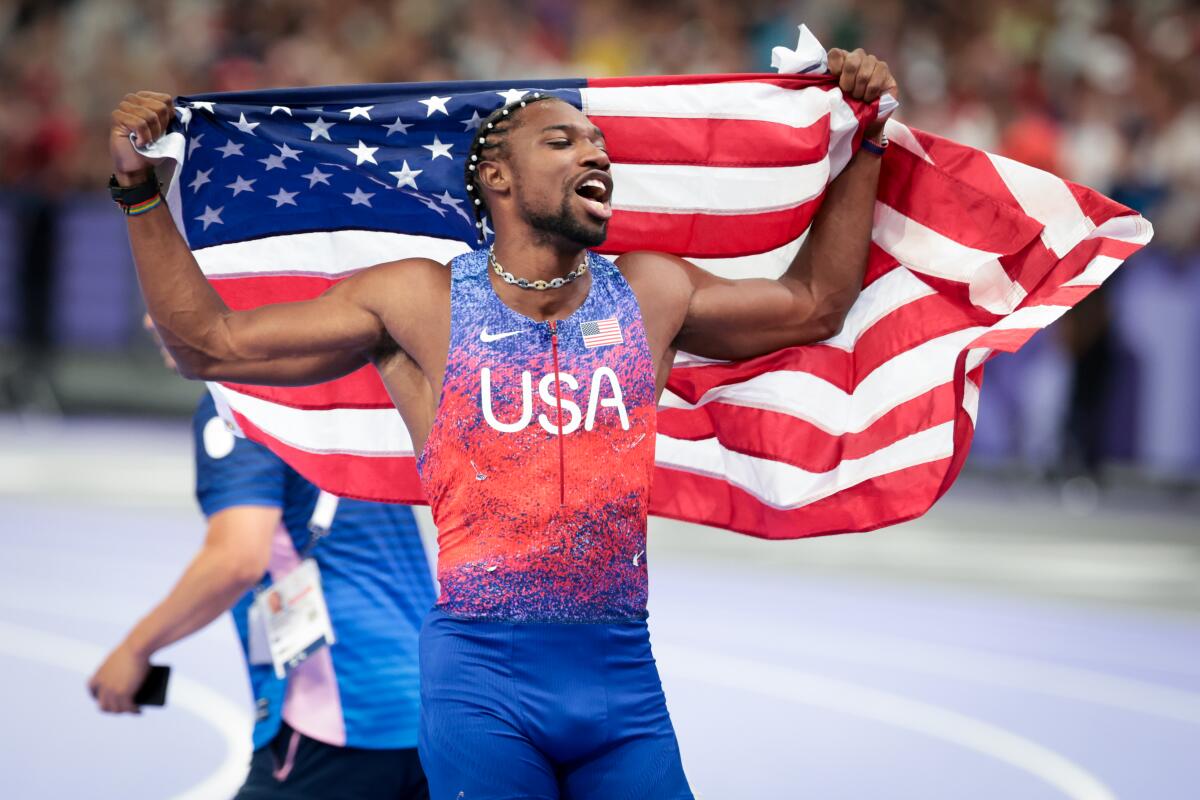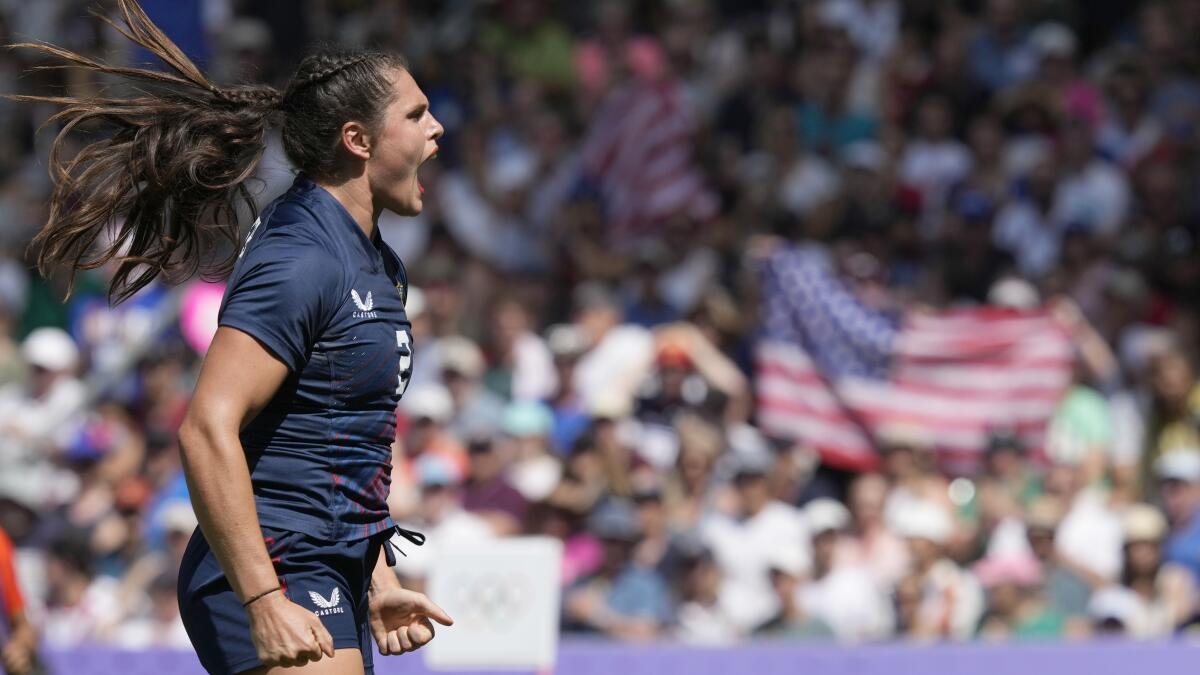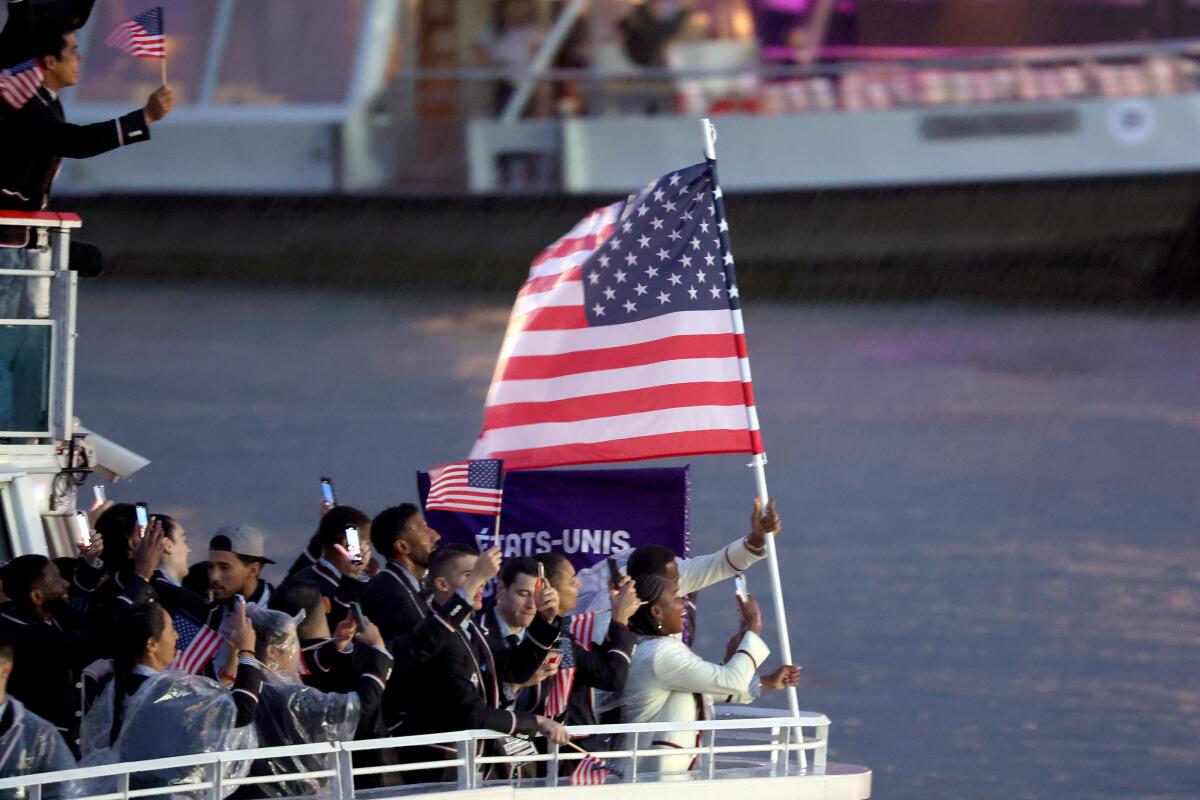It seems like only yesterday that a robotic disco horse galloped down the Seine and a chorus of decapitated Marie Antoinettes kicked off the Paris Games in a rain-soaked fever dream of an opening ceremony. But the Olympics are already heading into the home stretch and an event that got off to a soggy start has turned into a smashing success. Despite safety concerns that were amplified by sabotage of the country’s high-speed rail lines as the games were about to begin and political turmoil in France, the competition has proceeded without incident.
From a ratings perspective alone, Paris 2024 has been a success. U.S. viewership is way up compared to Tokyo in 2021, an event plagued by COVID delays, massive time differences and a creepy lack of spectators at most events. Over the first nine days of the Paris Olympics, an average of 32.6 million people tuned into coverage across NBC Universal platforms, including NBC and Peacock, a 77% uptick from the last Summer Games.
These Olympics have offered plenty of gripping human drama — uplifting stories, heartbreaking disappointments and photo finishes — that make them compelling even to millions of people who don’t usually consume hour after hour of televised sports. Athletic superstars like Simone Biles, Katie Ledecky and Noah Lyles have all lived up to the hype, turning in medal-winning performances under extraordinary scrutiny. And there’s been a steady flow of meme-worthy breakout stars, known not only for their athleticism but also for their passion for chocolate muffins, an insouciant shooting stance or Zen-like focus amid the frenzy of competition.
There have been been some culture-war dust-ups, concerns about sewage in the Seine and controversies over failed drug tests, soccer spying and athletes competing with COVID. But nothing about Paris 2024 so far has risen to the level of the scandals and political corruption that have tarnished so many recent games.
With the Olympics winding down, it’s time for a Paris 2024 vibe check. Writers Tracy Brown and Meredith Blake wrestle with the question: When did we stop worrying and learn to love the Games again?
U.S. swimmers Katie Ledecky, right, and Paige Madden celebrate after winning gold and bronze, respectively, in the women’s 800-meter freestyle event.
(Brynn Anderson / Associated Press)
Meredith Blake: I have never been someone who watches professional or college sports. But every four years, for most of my life, I get very, very into the Summer Olympics. I chalk some of this up to growing up in the ’80s and ’90s, at the tail end of the Cold War, when rooting for Shannon Miller over Svetlana Boginskaya felt like a healthy, nonviolent outlet for my latent patriotic fervor. There was also the thrill of seeing teenage girls who were just a few years older than I was at the center of such geopolitical drama, like sparkly leotard-clad proxies for the countries they represented. I was enthralled and always felt a pang of sadness when the Games were over and Bob Costas was no longer on my TV every night.
I continued to watch pretty regularly well into adulthood, especially the Summer Games, because I am a normie who loves swimming, diving, gymnastics and track and field. I vividly recall watching Michael Phelps score his eighth gold medal in 2008 and Gabby Douglas making history in 2012 as the first Black woman to win the gymnastics all-around title, but between the doping scandals, the human rights abuses in certain host countries and the terrible treatment and exploitation of our own athletes, somewhere along the line I fell out of love with the Games. It all just seemed, well, wrong. Maybe the Tokyo Games could have lured me back, but for a variety of pandemic-related reasons, the whole thing felt like a bummer.
Then came Paris, and I am back into the Olympics like it’s 1996 all over again — only this time Béla Károlyi is nowhere to be found and instead of being locked in brutal competition, the athletes I’m watching seem to be nothing but kind and supportive to each other. There have been many unforgettable moments, but none as indelible as the image of Biles and her teammate Jordan Chiles bowing down to Brazilian gymnast Rebeca Andrade during the medal ceremony for the floor exercise. It was both a laudable display of sportsmanship and a celebration of a historic first — three Black women claiming the top three spots in Olympic gymnastics.
Maybe it’s because of all the conflict around the world and the deepening political division at home, but these Games — at least the tightly packaged version of them we see on American TV — feel unifying in a way that few cultural events have in years. After the ghostly, spectator-free Games of 2021, it’s lovely to hear the roaring crowds and see proud parents cheering in the stands (although COVID remains a real threat, as made clear Thursday when Lyles ran the 200 meters while battling the virus and required medical attention after the race). I can’t get the Paris 2024 theme song out of my head — sorry, but it’s a banger — and I’ve had to repeatedly resist the urge to attempt a wolf turn on my kitchen floor. Tracy, have I completely lost my mind? Have I been NBC-pilled? Or do the Games feel fun again?

Noah Lyles celebrates after winning the men’s 100 meter final.
(Wally Skalij / Los Angeles Times)
Tracy Brown: Very fun. It seems like a lot of us have taken a sip of the Olympic Kool-Aid this time around because watching these Games has felt like a collective experience that, at least during the Tokyo Games in 2021, I thought we’d never get back to. Like you, I grew up with the Summer Olympics being must-see TV, finding myself suddenly invested in sports I forget exist outside these few weeks every four years. (Sorry, athletes: It’s not you, it’s me.) It’s one of the few occasions where patriotism feels uncomplicated and you get to just cheer on people chasing their dreams.
I don’t know if it’s the more forgiving time difference, but more people are watching and talking about these Games. My social media feeds are flooded with genuine appreciation for moments like that historic podium shot of Biles and Chiles bowing down to Andrade and Katie Ledecky’s impressive medal streak, as well as the meme-ification of our new favorite athletes like South Korean shooter Kim Ye-ji, Turkish shooter Yusuf Dikec and America’s own pommel horse guy Stephen Nedoroscik. Folks are even discussing their favorite commentators. That’s not to mention the snippets the athletes themselves are providing from the scenes like Suni Lee poking fun at her beam fall in the event finals, swimmer Henrik Christiansen chronicling his love for a certain pastry and pretty much every post from rugby sevens content queen Ilona Maher. It’s exciting when it feels like we know the people we are rooting for outside the NBC-produced packages or interview segments, and then see them deliver with medals.
Of course, not all of it has been feel-good “content.” There’s been some outcry regarding the women’s floor final podium, which ended with Chiles claiming the bronze after her coach submitted an inquiry about the difficulty rating initially assessed by the judges — a common occurrence — that resulted in her score inching above those of Romanian gymnasts Ana Maria Barbosu and Sabrina Maneca-Voinea (Romania has filed an appeal). Unsurprisingly, some of the online comments and attacks targeting Chiles, rather than the process or the officials, have been racist.
The social media outrage around boxer Imane Khelif also got very ugly, with misinformation helping fuel false accusations regarding her gender. Female athletes being questioned about their gender when they don’t fit certain standards of femininity is nothing new, but the hostility around those even perceived to be transgender has increased outside of sports in recent years. Being dragged into the conservative culture war against queer and trans people might be another signal that the Olympics are enjoying a bigger moment this time around, though. What about you, Meredith? Why do you think these Olympics have been able to strike a chord?

Rugby player Ilona Maher celebrates after scoring during the U.S.’s match against France.
(Tsvangirayi Mukwazhi / Associated Press)
Blake: You are right, Tracy. The vibes have not been entirely immaculate. Khelif was cruelly targeted by people who pretend to care about the integrity of women’s sports but have done nothing to celebrate the performance of the American women in Paris. Republican vice presidential candidate JD Vance — the same guy who suggested Biles was “showing weakness” when she withdrew from competition in Tokyo — joined the Khelif pile-on with a tweet suggesting that somehow Vice President Kamala Harris was responsible for “a grown man pummeling a woman in a boxing match.” Despite his professed concern for women in sports, Vance hasn’t had a single thing to say about how the American women have fared in Paris.
Which may be because they’re crushing it: The American women are on track to win more medals than their male counterparts at the Summer Games for the fourth consecutive time — a fact that doesn’t sit well with the cat-lady-haters of the world.
A lot of these culture warriors don’t actually want to see women competing at the Olympics. They’re the same people who spent years griping about Title IX or are happy to criticize women for having messy hair or too much muscle.
But I think a large part of the success of these Games is the very representation that some people resent. To me, it’s a heartening sign of progress to have a women’s gymnastics squad made up of grown women, mostly in their 20s, who come from diverse backgrounds and have overcome truly insane odds to reach the pinnacle of their sport. One of the great stories of these Games is Biles’ comeback after Tokyo. Unlike too many athletes in recent memory — especially in women’s gymnastics, which has always had a masochistic streak — she put her well-being first and triumphed as a result. It’s a paradigm shift we should all celebrate.
As we’ve seen so many times in TV and movies, there’s something powerful about seeing yourself — or, in the case of the Olympics, a much fitter, faster, flexible version of yourself — at the center of the culture. No doubt Paris is breaking through because the Olympians and their stories seem like a more accurate reflection of the country we live in — or wish we did. Social media also makes these elite athletes more accessible and human. We might not be able to swim as fast as that Norwegian guy, but we sure can relate to his passion for chocolate muffins.
One tell-tale — if slightly annoying — sign that the Olympics have reclaimed their mojo is the sheer number of celebrities who’ve shown up to celebrate and/or bask in the reflected glory of Team USA. At times, the Games have felt like an extended Golden Globes ceremony, complete with appearances by John Travolta and John Legend. As you discussed last week, NBC has been all too happy to plug these celebrity cameos — “Oh look, there’s Mariska Hargitay, star of ‘Law & Order SVU,’ the longest-running prime time drama in the history of American TV. Now back to diving.” But if I squint a little, I am able to see it in a more charitable light. Stars, they’re just like us. And they too want to see Ledecky win the 1,500-meter freestyle or Biles do the Yurchenko double pike vault.
As we look ahead to 2028, when the Games come to Los Angeles, what are your predictions? Do you think the proximity — and lack of a time difference — will elevate the vibes?

U.S. flag bearers Coco Gauff and LeBron James with their teammates on a boat on the Seine during the opening ceremony of the Summer Games.
(Wally Skalij / Los Angeles Times)
Brown: I’m sure that’s what U.S. TV rights-holder NBC is hoping for. And if you thought the Hollywood celebrity presence was overplayed by the telecasts this time around, NBC would like you to hold its beer. I wouldn’t be surprised if a reality competition show to determine who will be the Olympics’ next celebrity mascot (à la Snoop Dogg in Paris) is in the works.
I’m not quite old enough to remember what things were like the last time L.A. hosted the Olympics in 1984, although according to my parents, toddler me attended some events. But a part of me is worried that the Games being so close to home that it affects my daily life might take some of the shine away from it as a television event in the same way that covering the Oscars and Emmys has changed awards shows for me. (And that’s not to mention the valid concerns and criticisms people have raised over L.A. hosting the Games to begin with.)
That said, it is fun to imagine how L.A. will be celebrated in 2028. An opening ceremony that includes a flash mob on the 405, a parade of food trucks down Hollywood Boulevard and dancing water fountains in Echo Park Lake? Why not? (Don’t answer that.) Just keep the torch relay away from our mountains.
And although it is much to soon, I can’t help but wonder who will be our L.A. Olympic breakouts. Katie Ledecky and Simone Biles have deservedly become synonymous with the Summer Games, but will both 27 year-olds extend their historic runs? (Neither Ledecky nor Biles has ruled it out.) What new-to-me sport will become my favorite? (This year, it was women’s rugby sevens.) What food item will be an athlete’s unexpected obsession? (Tacos seems too obvious an answer.) Will we still be on TikTok and Instagram or will we have all moved on? Only time will tell.


